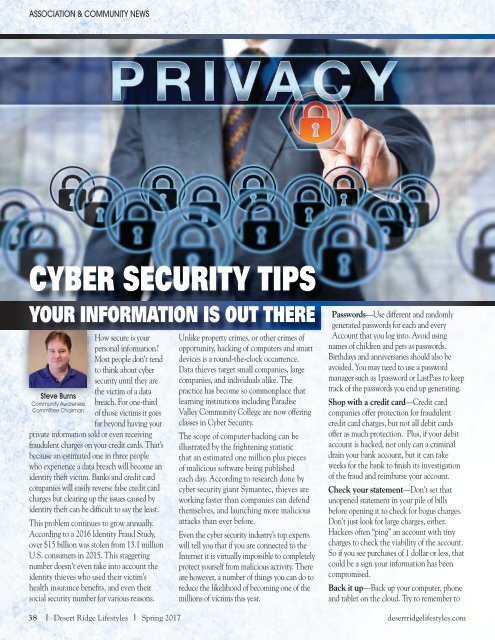Spring 2017
Create successful ePaper yourself
Turn your PDF publications into a flip-book with our unique Google optimized e-Paper software.
ASSOCIATION & COMMUNITY NEWS<br />
CYBER SECURITY TIPS<br />
YOUR INFORMATION IS OUT THERE<br />
Steve Burns<br />
Community Awareness<br />
Committee Chairman<br />
How secure is your<br />
personal information?<br />
Most people don’t tend<br />
to think about cyber<br />
security until they are<br />
the victim of a data<br />
breach. For one-third<br />
of those victims it goes<br />
far beyond having your<br />
private information sold or even receiving<br />
fraudulent charges on your credit cards. That’s<br />
because an estimated one in three people<br />
who experience a data breach will become an<br />
identity theft victim. Banks and credit card<br />
companies will easily reverse false credit card<br />
charges but clearing up the issues caused by<br />
identity theft can be difficult to say the least.<br />
This problem continues to grow annually.<br />
According to a 2016 Identity Fraud Study,<br />
over $15 billion was stolen from 13.1 million<br />
U.S. consumers in 2015. This staggering<br />
number doesn’t even take into account the<br />
identity thieves who used their victim’s<br />
health insurance benefits, and even their<br />
social security number for various reasons.<br />
Unlike property crimes, or other crimes of<br />
opportunity, hacking of computers and smart<br />
devices is a round-the-clock occurrence.<br />
Data thieves target small companies, large<br />
companies, and individuals alike. The<br />
practice has become so commonplace that<br />
learning institutions including Paradise<br />
Valley Community College are now offering<br />
classes in Cyber Security.<br />
The scope of computer hacking can be<br />
illustrated by the frightening statistic<br />
that an estimated one million plus pieces<br />
of malicious software being published<br />
each day. According to research done by<br />
cyber security giant Symantec, thieves are<br />
working faster than companies can defend<br />
themselves, and launching more malicious<br />
attacks than ever before.<br />
Even the cyber security industry’s top experts<br />
will tell you that if you are connected to the<br />
Internet it is virtually impossible to completely<br />
protect yourself from malicious activity. There<br />
are however, a number of things you can do to<br />
reduce the likelihood of becoming one of the<br />
millions of victims this year.<br />
Passwords—Use different and randomly<br />
generated passwords for each and every<br />
Account that you log into. Avoid using<br />
names of children and pets as passwords.<br />
Birthdays and anniversaries should also be<br />
avoided. You may need to use a password<br />
manager such as 1password or LastPass to keep<br />
track of the passwords you end up generating.<br />
Shop with a credit card—Credit card<br />
companies offer protection for fraudulent<br />
credit card charges, but not all debit cards<br />
offer as much protection. Plus, if your debit<br />
account is hacked, not only can a criminal<br />
drain your bank account, but it can take<br />
weeks for the bank to finish its investigation<br />
of the fraud and reimburse your account.<br />
Check your statement—Don’t set that<br />
unopened statement in your pile of bills<br />
before opening it to check for bogus charges.<br />
Don’t just look for large charges, either.<br />
Hackers often “ping” an account with tiny<br />
charges to check the viability of the account.<br />
So if you see purchases of 1 dollar or less, that<br />
could be a sign your information has been<br />
compromised.<br />
Back it up—Back up your computer, phone<br />
and tablet on the cloud. Try to remember to<br />
38<br />
| Desert Ridge Lifestyles | <strong>Spring</strong> <strong>2017</strong><br />
desertridgelifestyles.com





